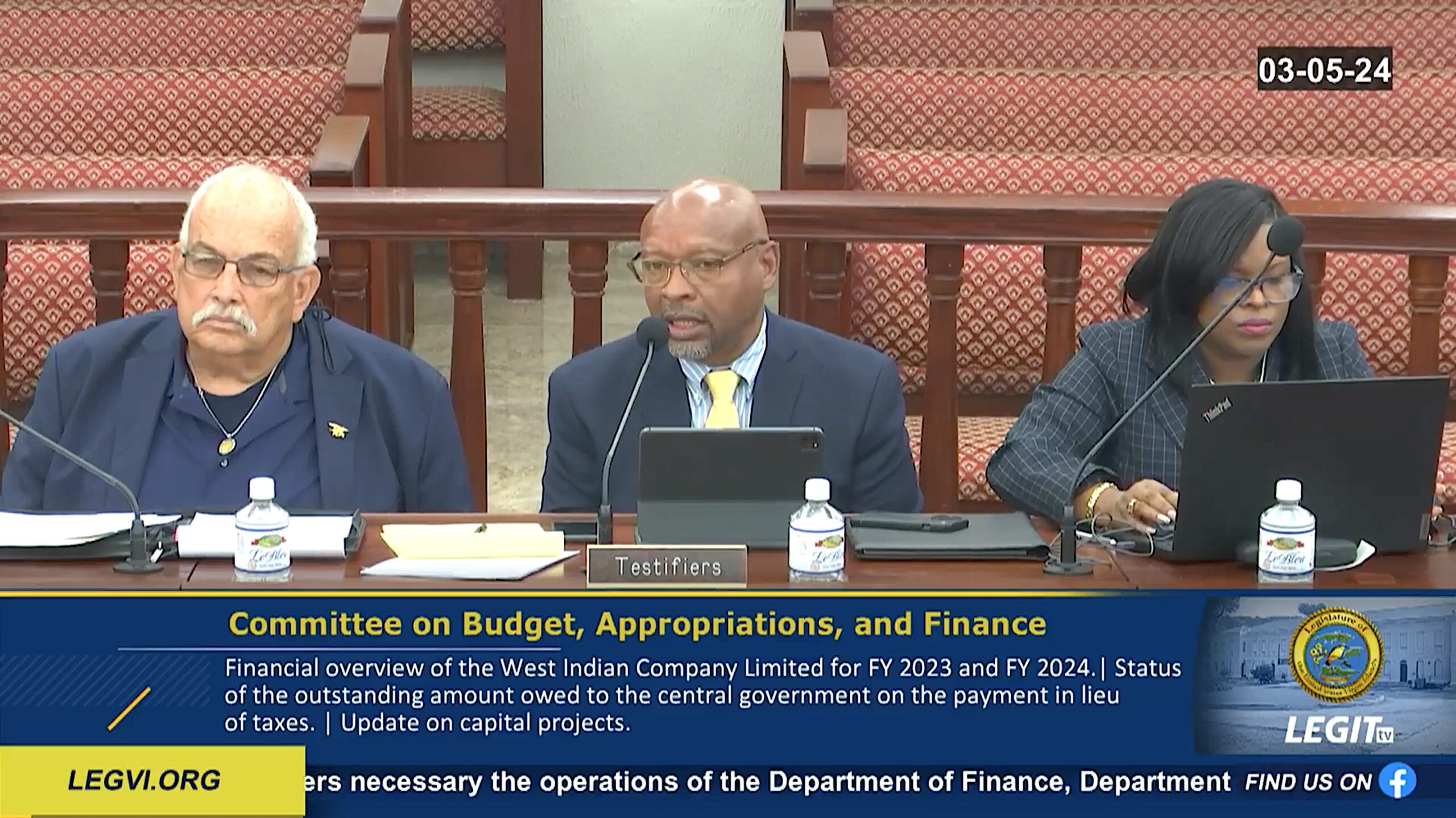
West Indian Company Limited leadership asked a Senate committee Tuesday to consider legislation that would reduce the cruise dock’s $10 million debt to the Virgin Islands government. Senators asked for more information and said to get creative in the meantime.
Even with cruise arrivals surging to near pre-pandemic levels at the Charlotte Amalie Harbor facility, WICO still struggled to escape the financial maelstrom of the 2017 hurricanes and COVID, said CEO Anthony Ottley.
WICO, a semi-autonomous company within the Public Finance Authority, has bond debt on the books until at least 2053, said Charlene Turnbull, the company’s chief financial officer. The company also owes $10 million in the equivalent of back taxes.
In 1999, the Virgin Islands government allowed WICO to pay $500,000 a year instead of regular taxes. This payment in lieu of taxes — or PILOT — amount was increased to $1 million in 2003, when WICO was averaging 1.7 million passengers annually, Ottley said.
WICO fell behind on payments almost immediately, missing payments from 2006 to 2019, Ottley said. Today, with the PILOT set at $700,000, WICO is behind roughly $10 million.
“We still have not reached to the point where we may be able to pay the PILOT,” Ottley said.
He asked that it be reduced again or the program be changed to a set percentage of income generated. The current amount was “burdensome” and “excessive,” he said because myriad international, national, and local events since the late 1990s drastically reduced the company’s revenue.
“We maintain that a PILOT commensurate with a percentage of our annual revenue — as originally proposed when WICO was purchased — would be preferable as it would allow WICO to meet our obligation to the government of the Virgin Islands, and to improve the company’s credit rating, thereby allowing us to borrow for capital improvements. Addressing this challenge is the first step in restoring the financial community’s confidence in WICO as a sound investment. It also will strengthen our position as a company,” Ottley said.
He said WICO was looking for additional revenue streams.
Senators on the Budget, Appropriations and Finance Committee suggested the company partner with WAPA to sell power to ships docked at the WICO facility. Shore-to-ship electricity, also known as shoreside power or the naval expression, cold ironing, has become popular in many ports for environmental reasons and where electricity generated on land is cheaper and more efficient to produce. With some of the highest cost per kilowatt in the Western Hemisphere, the Virgin Islands may not be an ideal fit.
Ottley said he’d already spoken to two cruise lines interested in the idea but had advanced to the planning stage.
Cruise arrivals surged by 43.3 percent last year after the 2022 doldrums, Ottley said. Nearly 825,250 arrived at the WICO dock on 261 ships, feeding $6.4 million to the company’s coffers and pumping $136 into the local economy, he estimated. The 2024 forecast is even better with 281 ships scheduled to tie up at WICO bearing roughly one million passengers.
By 2025, Ottley hoped his quay would host 1.1 million passengers, a return to 2019 norms. A return to form, however, may not be enough. Through most of its 111-year history, the WICO dock was the premier St. Thomas cruise pier, with spill-over ships berthing in Crown Bay, administered by the Port Authority. That changed when Crown Bay was developed into a state-of-the-art cruise facility. Now, Ottley said, WICO is the spillover destination.
Many modern cruise ships are simply too big to squeeze into the crowded harbor and those that can are limited to the space the WICO dock can provide. Even with planned dredging and installation of additional bollards, WICO will likely still have to turn away ships that might otherwise tie up.
“Most notable is the development of Crown Bay and the Austin ‘Babe’ Monsanto Marine Terminal, which siphoned more than 30 percent of WICO’s cruise ship traffic to its facilities without the company receiving the immediate, necessary reduction in its PILOT. This immediately resulted in a 35 percent reduction in WICO’s average passenger visits, down from 1.7 million to between 1.1 to 1.2 million passengers,” Ottley said.
But, the senators pointed out, that business isn’t lost; it simply moves to another arm of the Virgin Islands government, the Port Authority.
Officials from the Government Employees Retirement System also had the port in mind at the Senate Tuesday, asking that the legislators limit how much GERS could be sued in personal injury litigation. A $75,000 maximum would put the system in line with other semi-autonomous government entities like the Virgin Islands Port Authority and the Virgin Islands Housing Authority, said Dwane A. Callwood, Sr., chairman of the GERS Board of Trustees.
Currently, there is no cap for suits against GERS, which owns the Havensight Mall land and other properties.
“We live in a very litigious society and GERS is seen by many, including the almost one million visitors that traverse the Havensight Mall, as having deep pockets. The GERS has even been a named defendant in lawsuits involving incidents that took place not on GERS-owned properties but on adjacent properties. This liability cap would go a long way towards protecting the sustainability of GERS,” Callwood said.
Angel Dawson Jr., the GERS administrator and CEO, said some people may consider slipping and falling on GERS property the equivalent of winning the lottery.
“We would like to deter frivolous suits for hundreds of thousands or even millions of dollars,” Dawson said.
Callwood and Dawson also spoke in support of a bill that would restart a program extending personal loans to GERS members. The GERS Board had been discussing the plan since July 2023, Callwood said.
“The board is also committed to working on a limited personal loan program for retirees as well as the next phase after the restart of the active employee loan program,” Callwood said.





